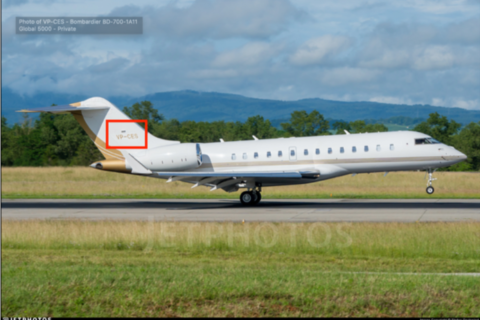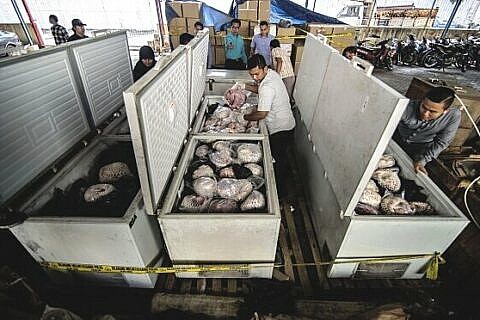Paper Trails
Russian Private Military Company “Wagner” has appeared at the vanguard of Russia’s foreign policy ambitions, from Eastern Ukraine to Syria to Venezuela. In this piece, we examine how and why networks of private companies allow Russia to promote its interests around the world.
PMC Wagner, a Russian private military firm supported by US-sanctioned oligarch Evgeniy Prigozhin, has been everywhere lately – whether in Eastern Ukraine, Syria, or Venezuela, the shadowy outfit has appeared at the vanguard of Russia’s foreign policy ambitions, providing a lightweight and deniable force that can be used to project Russian power at short notice and little cost. For analysts and observers, understanding where Russian private military forces are is important for gauging overall Russian policymaking intentions in a given region.
But merely understanding where Russian military contractors have been appearing misses half the story: equally illuminating are the trading relationships that show how contractors are sustaining themselves with supplies, and how these companies relate to Russian-owned extractives ventures. To take a closer look at these links, we analyzed customs records (held by author) and other official documentation to identify a global logistics network supporting companies associated with Prigozhin and PMC Wagner. This wider network extends from Saint Petersburg to Madagascar, and even touches the shores of Hollywood Beach in Florida, providing clues to the way in which networks of private companies allow Russia to promote its interests around the world.
Official and Unofficial Russian Activity Across Africa #
Since 2017, a network of individuals and ostensibly private Russian companies have engaged in military assistance, political interference and exploitation of mineral wealth across Africa, facilitated in large part by close connections with commercial and political entities based in Russia. This activity has taken place in Sudan, the C.A.R., Madagascar, Libya, Burundi, and beyond. In the C.A.R., Russian personnel allegedly employed by Wagner have been involved in military training, while companies allegedly affiliated with Prigozhin have engaged in activities as diverse as mining, cultural events and diplomatic efforts with rebel groups. In Sudan, Russian contractors have provided security services, while a Prigozhin-linked company has engaged in mining. Prigozhin himself has been present at high-level military discussions in Libya, where his contractors are alleged to be active in support of rebel leader Khalifa Haftar. In Madagascar, political consultants affiliated with Prigozhin have offered support to a range of local politicians, while a shadowy Russian mining firm tried and failed to establish a joint venture with state-owned mining company.
In each theater, these activities have been facilitated by an opaque corporate network of entities active in both Africa and Russia. Though their activities can be difficult to observe, each of these entities has a point of vulnerability: they depend on logistics providers to survive. As their logistical needs become more complex, the legal architecture of shell companies, trading relationships, and physical installations they must employ becomes more visible. We scrutinized these visible points, analyzing Russian customs records that detail trade between alleged Wagner affiliates in Africa and their support base back in Russia.
Two of the more visible entities in the network are Lobaye Invest in the Central African Republic, and Meroe Gold in Sudan, two companies that Russian investigative journalists have identified as being connected with Prigozhin. Lobaye has engaged in activities ranging from mining to beauty pageants and the screening of Russian movies. In July of last year, three journalists were killed under mysterious circumstances while investigating the activities of Wagner in the C.A.R, immediately prior to planned filming at gold mines operated by Lobaye Invest.
In Sudan, Meroe Gold’s mining operations have converged with political repression — unconfirmed reports allege that Russian guards have fired on local protestors, and that armed Russian personnel appeared at December protests. Additionally, according to Russian investigative outlet Proekt, Prigozhin sought to establish a foothold in Madagascar through a partnership with the state-owned mining firm Kraomita Malagasy S.A. This ultimately failed partnership dovetailed with attempts at political influence, and, as Russian trade record indicate, a larger logistics network supplying Meroe Gold and Lobaye Invest.
Both Lobaye Invest and Meroe Gold appear in commercially available Russian customs data, which shows them conducting trade with Russia-based firms M-Finance and M-Invest. Both of these companies are associated with Prigozhin in public reporting. M-Invest’s regional director is also a former business partner with an employee of Prigozhin’s infamous ‘troll farm’ who was indicted by the US Department of Justice.
Russian customs records corroborate this link, and illustrate how this network of companies supplies and supports Prigozhin-affiliated companies in Africa. They also show scale and change over time:
- According to customs data, Meroe Gold received more unique shipments from Russia than any other company in Sudan during this period.
- Meroe Gold imported large amounts of geological equipment for mining exploration in 2017, before importing more heavy equipment including front-loaders and bulldozers.
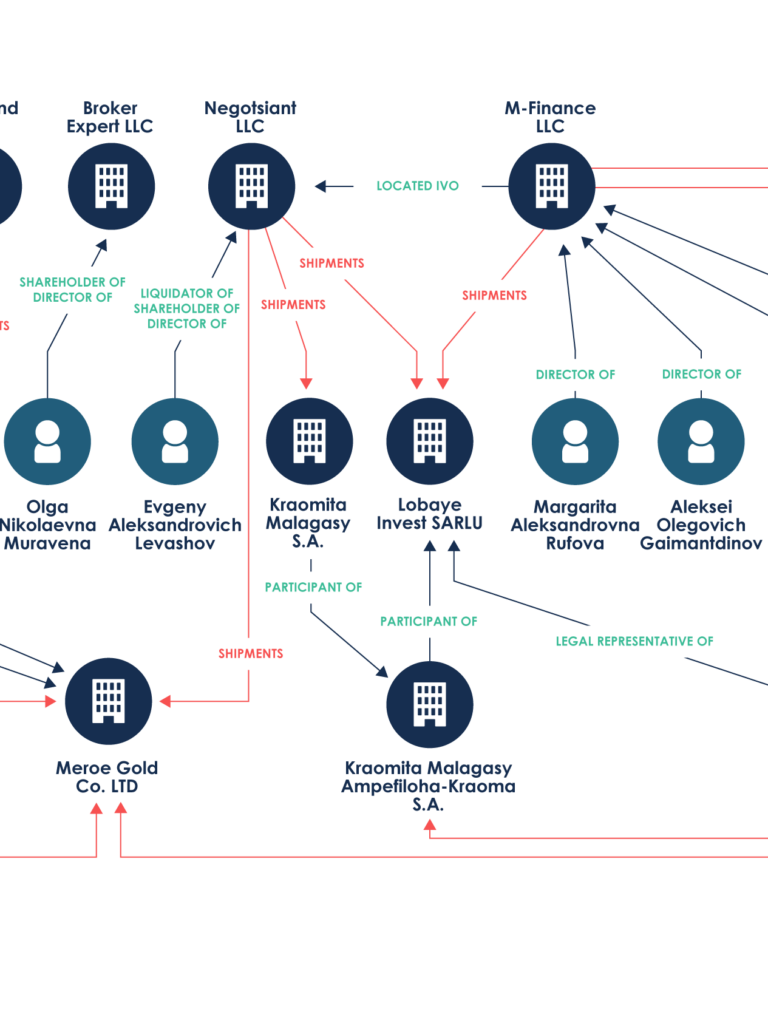
Taking a more granular approach to these records shows us the chain of custody of these shipments, down to their eventual end use. In at least two cases, this methodology helps illuminate the provenance of vehicles employed by alleged Russian private military contractors, showing how armored vehicles and transport helicopters transited from Russia to end destinations in Africa all along Prigozhin-controlled supply chains.
Big Wheels – Ural Transport Vehicles #
According to trade data reviewed by C4ADS, M-Invest, M-Finance and other Russian companies in this network supplied heavy transport vehicles to their partners in Africa which have since appeared in a variety of settings — from training the Central African Republic’s armed forces, cruising Khartoum during the December protests in Sudan, and being stopped by rebel militias in the C.A.R.
According to export declarations, M-Finance sent one Ural 4230 multi-purpose vehicle to Lobaye Invest in the Central African Republic on January 25, 2018. The export declaration accompanying this shipment bears the name of Evgeniy Khodotov, a regional representative of Lobaye Invest on mining concessions document from the C.A.R. (See document below). Khodotov is alleged by Russian investigative media to have been an employee of the Saint Petersburg Regional Counter-Organized Crime Directorate and the Main Directorate of the Ministry of Internal Affairs of Russia.
According to export declarations, M-Finance sent one Ural 4230 multi-purpose vehicle to Lobaye Invest in the Central African Republic on January 25, 2018. The export declaration accompanying this shipment bears the name of Evgeniy Khodotov, a regional representative of Lobaye Invest on mining concessions document from the C.A.R. (See document below). Khodotov is alleged by Russian investigative media to have been an employee of the Saint Petersburg Regional Counter-Organized Crime Directorate and the Main Directorate of the Ministry of Internal Affairs of Russia.
A few months later, trade data shows that the Saint Petersburg-based Broker Expert shipped 20 of these vehicles to Meroe Gold on May 25, 2018. These Urals, all manufactured in 2018, were shipped out from Novorossiysk, and were collectively valued at EUR 518,400.00.

Tweet It“According to Russian customs data, Meroe Gold is the only foreign company that Broker Expert has exported to. The Russian Federal Statistics Service documents that Broker Expert reported RUB 186,771,000.00 in revenue in 2017, when it began to export to Meroe Gold (USD $ 2,900,553.63 at the current rate). Prior to this, Broker Expert had a revenue of around RUB 2,010,000 in 2016 (USD $ 31,215.30 at the current rate). ”
Open source investigators with Bellingcat, Conflict Intelligence Team, and BBC have identified the presence of Ural 4230s in Sudan and the Central African Republic. Some of these vehicles appear to be up-armored. They frequently appear alongside armed and uniformed personnel.
Training of CAR Armed Forces #

Convoy of Armed Russian Nationals in Car #



Armed Russian nationals in C.A.R. in 2018. Note Ural vehicle in background, from video taken by FPRC rebels released by France24
Presence at Protests in Sudan #


Images of Ural 43200s at December protests in Sudan, from Jon Hutson and Conflict Intelligence Team.
At Meroe Gold Location in Sudan #

Big Birds: MI-8T Helicopters #
Ural trucks aren’t the only heavy vehicles that this network has shipped to Africa. Customs data indicates that M-Finance shipped an Mi8-T transport helicopter, registration number RA-06114, to Meroe Gold, in February of 2018. Evgeniy Khodotov also appears on the customs declaration for this shipment. M-Invest sent an additional Mi-8T to Meroe Gold on the same date.
MEROE GOLD
According to Sudanese media, the Regional Director of Meroe Gold is Mikhail Potepkin. Conversely, Russian government publications identify Potepkin as the Regional Director of M-Invest.
Potepkin was once a ‘Commissar’ in pro-Putin youth group “Nashi”, before owning the tech company ‘IT-Debugger’ along with with Anna Bogacheva, an employee of Prigozhin’s Internet Research Agency, who oversaw the IRA’s data analysis team and who is alleged by the US Department of Justice to have collected intelligence in the United States in 2014. Bogacheva was indicted by the US Department of Justice for her work with the IRA.
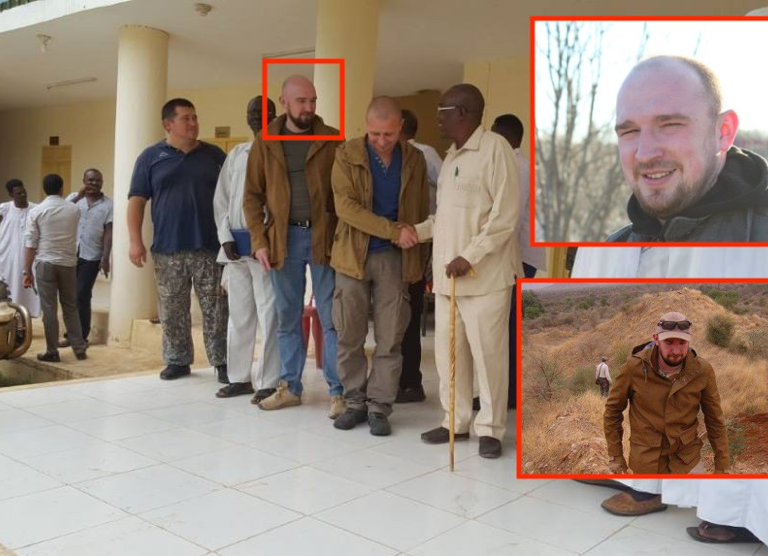
In a video uploaded to YouTube by user Alex Tupolev on February 25, 2019, an Mi-8T transport helicopter with tail number RA-06114 appears in C.A.R., operated by Russian nationals. In the video, produced by the Presidency of C.A.R., French narration explains that the Russians use the helicopter to deliver humanitarian aid. European individuals in the video appear to deliver supplies and mattresses, wearing fatigues.
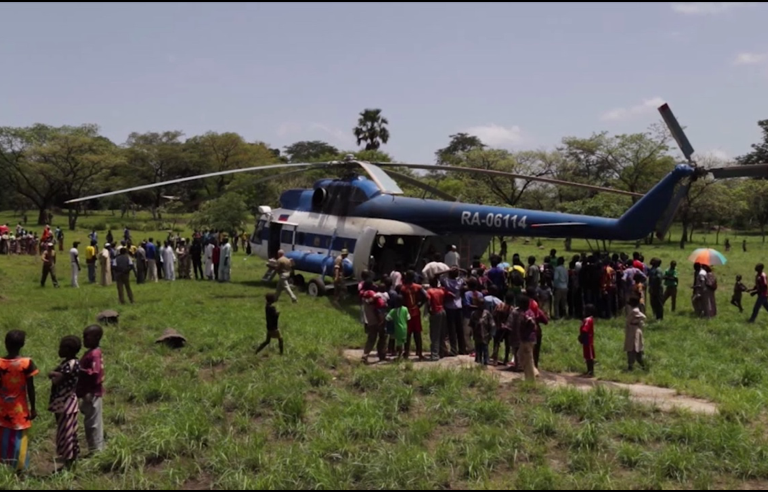


To Bangui With a Layover in Miami #
At least four shipments of equipment had a US nexus, with the customs data showing an address in Hollywood, Florida for the recipient. Though the equipment likely never actually transited the US, the mysterious Florida address indicates that this Russian-African network may have a logistical node in South Florida.

Beginning in early 2018, M-Finance began routing its shipments to Lobaye Invest in the C.A.R. through Kraomita Malagasy S.A, a state-owned mining company in Madagascar with which an opaque Russian mining company was reportedly forming a commercial joint venture. Three shipments on May 25, 2018 and one on June 15, 2018 went from St. Petersburg in Russia to the C.A.R via Madagascar. These shipments contained 72 ‘PUS – 1’ police batons, 423.6 kilograms of ‘Shturm 3’ riot shields, uniforms, hard drives, printed products and ballpoint pens.
Customs data shows that these shipments, delivered to Antananarivo International Airport, were evidently ultimately bound for the C.A.R. according to the listed recipient. However, the recipient’s address was listed as 3505 S. Ocean Drive, Hollywood, Florida, indicating that the receiving party or its representative was located at that address.
While no U.S company was named in these records, C4ADS used Florida corporate records to identify a number of businesses registered at this address, including two corporate and legal services providers and real estate firm that each had offices in both Florida and Russia. These corporate service providers have registered numerous companies at this address and others.

This pattern of information in customs declarations is not necessarily unusual, particularly given the common role of freight forwarders or other facilitators in international trade. Certainly, nothing in the trade data or our research provides solid evidence of any illegal activity. This shipment was unusual, however, because each of the parties involved have been associated in public reporting with Evgeniy Prigozhin and PMC Wagner, in relation to the training of the C.A.R. armed forces, political activity in C.A.R. and Madagascar, and the killing of three Russian journalists.
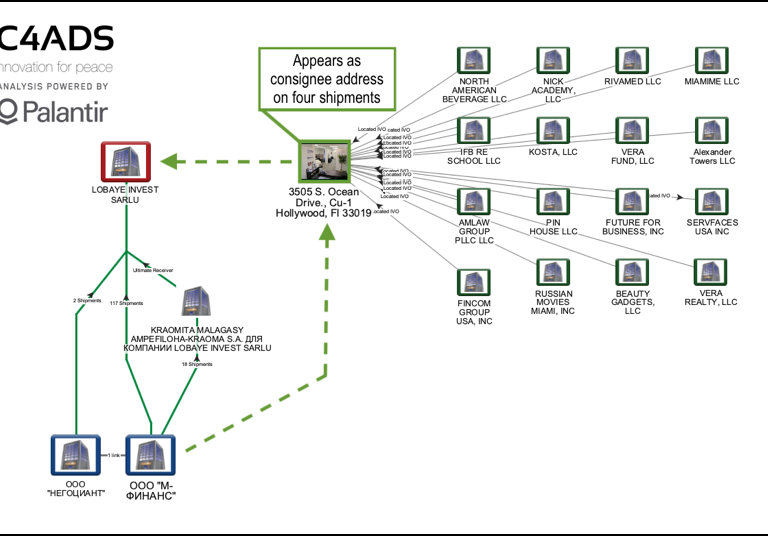


Right: Universal Specialized Baton-1 manufactured by Special Materials Corp., the same model sent to Lobaye Invest. Left: Shturm-0 riot shield, the same model sent to Lobaye.
Observing Grey Activity #
Prigozhin’s ventures’ open source footprint gives insight into at least one element of Russia’s assertion of its influence in Africa—the millions of dollars of investment supporting actors involved in mineral extraction, military assistance and political interference. This is likely just a small part of the finance behind Russia’s growing profile on the continent.
The evident integration of these ostensibly private actors with activities of the Russian government makes it all the more surprising that this network would have a connection to the US. The US nexus in this case demonstrates the permeability of jurisdictions that allow for obscured ultimate beneficial ownership, and the importance of verifying the identities and affiliations of parties to trade transactions.
The private nature of Russian military contractors permits them to behave dynamically, with activities across a range of sectors, some of which appear to coincide more directly with Russian foreign policy objectives than others. This also creates opportunities for leverage: every point where Prigozhin’s activity relies on a commercial company, be it a bank or a customs broker, is a point for governments and the private sector to apply pressure.

